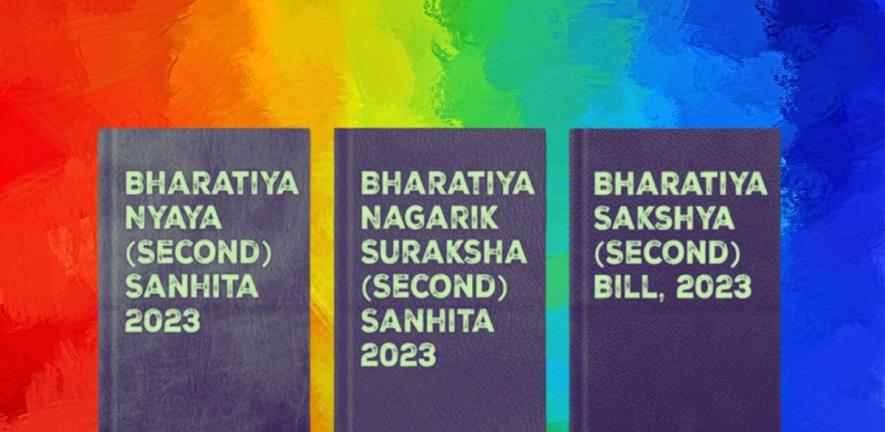Bharatiya Suraksha Sanhita: Are we Perpetuating Police Custody?

The threat to the Constitution of India has unfortunately increased. In its third term, the Bharatiya Janata party-led National Democratic Alliance government has enacted new criminal laws even though these threaten fundamental rights, especially those relating to arrest and custody. The powers of police and political leaders of the ruling party have been enhanced.
The new criminal laws have been described by many as having some “retrograde provisions”. The Bharatiya Nyaya Sanhita (BNS) defines crimes and prescribes punishments. It also includes provisions for protecting victims of crime and speedy trial of cases. This is the precisely the problem with it.
The BNS, BNSS, and the Bharatiya Sakshya Adhiniyam (BSA) have replaced the Indian Penal Code, 1860, the Code of Criminal Procedure, 1973, and the Indian Evidence Act, 1872, respectively.
In the name of protecting the victims of crimes, a speedy trial infringes upon the basic rights of an accused or a suspected person. If one text of BNS (Indian Penal Code) is examined together with Suraksha Sanhita (Cr.PC), the mischievous design will be exposed. The Bharatiya Nagarik Suraksha Sanhita (BNSS) deals with the procedures for investigation and the trial of criminal cases. It also includes provisions for protection of witnesses and speedy disposal of cases. Another important part of the new laws is the Bharatiya Sakshya Act, 2023, which deals with admissibility of evidence in criminal trials. All these violate the basic principles of criminal law.
The three Bills had been referred to the Parliamentary Standing Committee on Home Affairs for scrutiny and recommendations. However, this was just an empty protocol or formality. The committee submitted its report within three months (on November 10, 2023).
The new law empowers the jurisdictional magistrate to grant police custody up to 15 days in case an investigation cannot be completed within 24 hours. But, one day in ‘jail’ is not a small time, anything can happen.
First of all, police have no time to investigate. So, what usually happens is that police do not find time to investigate because of political pressures, etc. Under new criminal laws, the time period of imprisonment in custody has been increased. For instance, (under the new criminal law), Section 187 of the BNSS, which seeks to replace CrPC, says that police custody of 15 days can be authorised in whole or in parts at any time during the initial 40 or 60 days out of the 60- or 90-day period of judicial custody.
Here, we need to understand the claim made by the Home Minister Amit Shah on the new criminal laws. While addressing a press conference, Shah said the maximum police custody under BNS, too, would remain 15 days, like under the IPC.
“I want to clarify that in BNS also, the remand period is 15 days. Earlier, if an accused was sent to police remand and got himself admitted to a hospital for 15 days, there was no interrogation, as his remand period would expire. But, in BNS, there will be remand for a maximum of 15 days, but it can be taken in parts within an upper limit of 60 days,” he said.
The Home Minister also said that the new laws would ensure “justice instead of punishment” and “speedy trial instead of delays”. Justice would be delivered “up to the level of the Supreme Court” within three years of an FIR being registered, he added.
That police custody of 15 days may be spread over 60 days even in cases where the offence is punishable with at least 10 years of imprisonment, or 40 days for any other offence, means the police will become more powerful, and avoid review of judicial examination of arrested persons. This will result in extra-judicial measures. The change in police custody rules is, therefore, a serious concern, and has been raised by civil rights supporters and lawyers.
The new criminal laws violate the constitutional principles, provisions and could pose a threat to the fundamental and civil rights of citizens.
Violating the Constitution
The so-called new reforms of criminal laws are also a matter of grave concern for those ‘suspected’ (even before designating them as ‘accused’). The limit of police custody within the first 15 days from the time of arrest has been removed, permitting the magistrate to order police custody for 15 days anytime during the initial 40-60 days of custody.
The earlier bar on seeking police custody once a magistrate grants judicial custody, has been done away with. For example, it was also claimed that the first case registered under BNS was related to a motorcycle theft in Madhya Pradesh’s Gwalior at 10 minutes past midnight. The case was for a value of Rs 1,80,000. The case against a street vendor in Delhi was not the first case registered under BNS. In fact, the police disposed of the Delhi case by using the provision of review, showing the true colour of the new ‘criminal’ law.
Also, the police can, conveniently, based on a magistrate’s order, can shift an accused from judicial custody back to police custody at any time beyond the first 15 days of arrest, even if he/she has been granted judicial custody.
The mighty power of police spells danger for a suspected person, who can be exposed to torture, intimidation, among other things.
The new criminal laws, therefore, seriously hit jurisprudence around custodial power in our country, and goes against the spirit of the Constitution.
The Home Minister also said that the new criminal laws were discussed in the Lok Sabha for nine hours and 29 minutes, and in the Rajya Sabha for six hours and 17 minutes. Suggestions were sought from all MPs, Chief Ministers, Supreme Court and High Court Judges, IPS officers, and Collectors in 2020, he added.
Further, Shah said. “I have attended 158 consultative meetings for preparing the Bill… The Bill was sent to the Home Ministry committee, which discussed it for about three months. Most of the suggestions for reforms in criminal laws were incorporated, except four which were political. Giving political colour to this change is not good, there are many other issues for politics”.
But, the reality is that the new criminal laws violate constitutional principles, and provisions and are a danger to civil and fundamental rights of citizens.
The writer is Professor, School of Law, Mahindra University, Hyderabad. The views are personal.
Get the latest reports & analysis with people's perspective on Protests, movements & deep analytical videos, discussions of the current affairs in your Telegram app. Subscribe to NewsClick's Telegram channel & get Real-Time updates on stories, as they get published on our website.
























